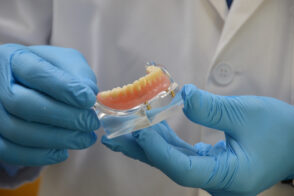As we grow older and our mouths change shape, the density and strength of our bones and gum tissue change as well. For those who wear dentures, these natural occurrences can cause dentures to become loose and ill-fitting. Loose or unstable dentures can frequently interfere with your ability to speak and eat comfortably. Chewing can become difficult and food can become trapped under your dentures, causing damage to the underlying bone. If you have a denture that doesn’t fit properly and want an alternative to using adhesives, denture implants may be a good option for you.
Dentures fitted on implants

A denture fitted onto implants involves surgically placing 2 metal screws or more (implants) into the jaw. Within 8 to 24 weeks, the implants will have healed and fused to your jawbone. Your denturist will then make a custom-fitted denture designed to fit over the implants securely.
This method of fitting your denture ensures you will be able to chew and speak normally without concern or embarrassment over your denture becoming loose and falling out.
The reduction of friction will also help in retaining bone density and strength as the denture is more securely fitted.
Cleaning and Maintenance of Implanted Denture
Just like natural teeth, dentures need to be cleaned daily!
With an implanted denture, you should also clean around the implants every day to keep your bone and gum tissue healthy. Scheduling and attending regular check-ups with your denturist will enable them to monitor the performance of the denture as well as the tissue around your implants.
While implant-supported dentures have many advantages over conventional dentures, they are not necessarily the best solution for everyone. It’s always best to talk to your dentist or denturist about the solution that best fits your needs and budget.
To learn more about implant-supported dentures, contact us today!


